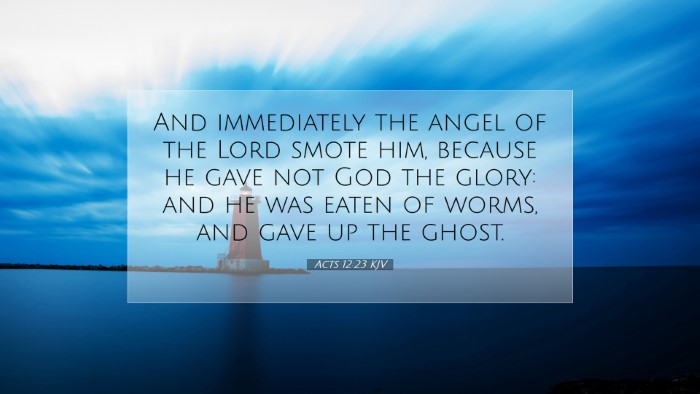Old Testament
Genesis Exodus Leviticus Numbers Deuteronomy Joshua Judges Ruth 1 Samuel 2 Samuel 1 Kings 2 Kings 1 Chronicles 2 Chronicles Ezra Nehemiah Esther Job Psalms Proverbs Ecclesiastes Song of Solomon Isaiah Jeremiah Lamentations Ezekiel Daniel Hosea Joel Amos Obadiah Jonah Micah Nahum Habakkuk Zephaniah Haggai Zechariah MalachiActs 12:23
Acts 12:23 KJV
And immediately the angel of the Lord smote him, because he gave not God the glory: and he was eaten of worms, and gave up the ghost.
Acts 12:23 Bible Commentary
Acts 12:23 Commentary
Verse: "And immediately the angel of the Lord smote him, because he gave not God the glory: and he was eaten of worms, and gave up the ghost."
Introduction
This verse serves as a sobering reminder of the consequences of pride and the importance of giving glory to God. It depicts the sudden fate of Herod Agrippa I, who, in his arrogance, failed to recognize the sovereignty of God. This commentary synthesizes insights from Matthew Henry, Albert Barnes, and Adam Clarke, providing a multifaceted understanding of the implications of this verse.
Contextual Analysis
In understanding Acts 12:23, it is crucial to consider the context surrounding Herod's reign and actions. Herod Agrippa, who had gained political power and prestige, sought to please the Jewish people by persecuting the early Christians. His previous successes in arresting Peter and executing James had garnered him favor, leading to his ultimate prideful proclamation before the people.
The Background of Herod
Herod Agrippa I was the grandson of Herod the Great, known for significant historical relevance in Jewish history. His ambition and desire for recognition made him a key figure of interest not only in political narratives but also in theological teachings regarding humility and divine justice.
Theological Insights
Pride and Divine Judgment
According to Matthew Henry, Herod's failure to give glory to God is a central theme in this passage. The divine judgment that followed is indicative of God's intolerance for human pride. Henry emphasizes that God does not share His glory with anyone, and when pride reaches its peak, divine intervention becomes inevitable.
The Role of Angels
Albert Barnes explains that the term "angel of the Lord" refers to a divine messenger acting on behalf of God’s will. This emphasizes God's active role in human affairs, especially in matters of justice and righteousness. The use of an angel to execute judgment serves to illustrate God's authority over earthly powers.
Physical and Spiritual Consequences
Adam Clarke elaborates on the physical consequences of Herod's fate — being "eaten of worms." This vivid imagery not only denotes a grotesque end but also symbolizes the decay of pride and the transience of power. Clarke stresses that this outcome serves as a powerful reminder of mortality and the inevitable downfall of those who oppose God.
Lessons for Contemporary Believers
- The Danger of Pride: Just as Herod's pride led to his destruction, believers today must be mindful of their own tendencies toward arrogance.
- God’s Sovereignty: The verse reiterates the principle that human authority is ultimately subject to divine rule. Believers are encouraged to remember that God's plans supersede human ambition.
- Giving Glory to God: It serves as a call to humility, reminding individuals to acknowledge God's grace and mercy in their successes and achievements.
- The Importance of Accountability: Herod’s public display of arrogance serves as a warning to all in leadership positions, urging accountability and a humble demeanor in authority.
Conclusion
Acts 12:23 encapsulates a profound message centered on the consequences of pride and the unwavering glory of God. The insights from the commentaries by Matthew Henry, Albert Barnes, and Adam Clarke together provide an intricate understanding of divine justice, authority, and the call to humility. As believers reflect upon this passage, may they be inspired to live in a way that honors God and acknowledges His ultimate sovereignty in every aspect of life.


